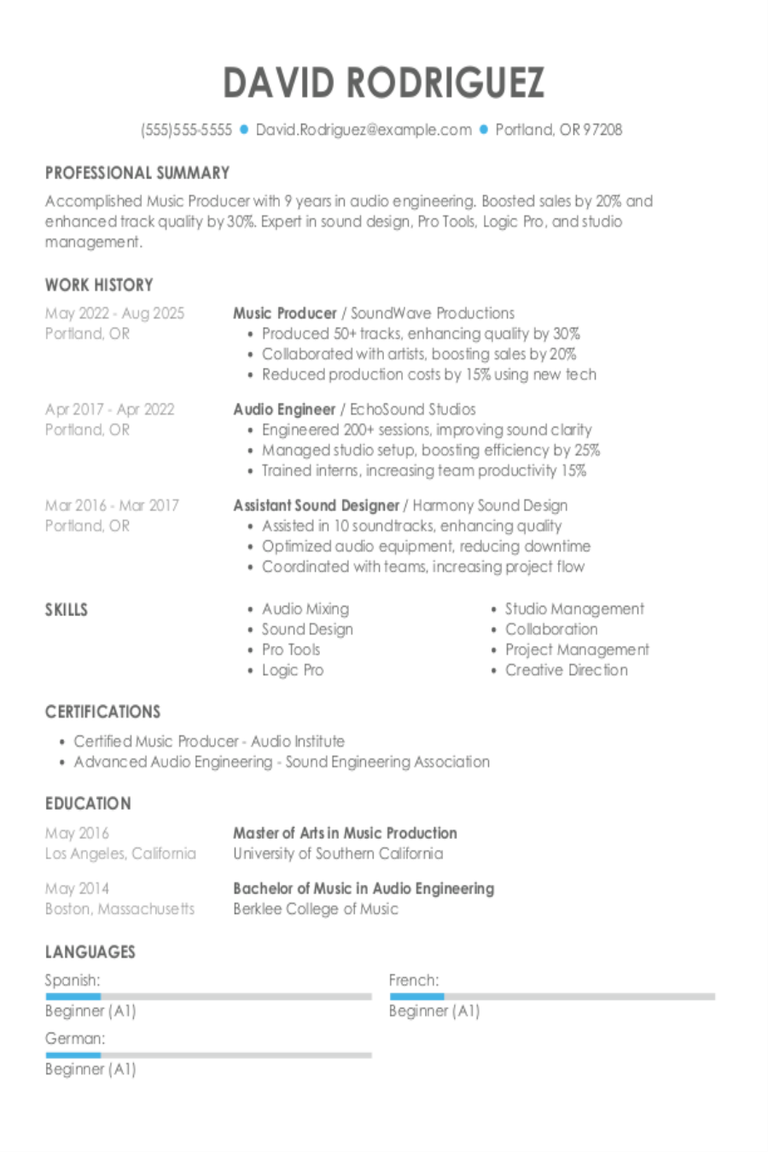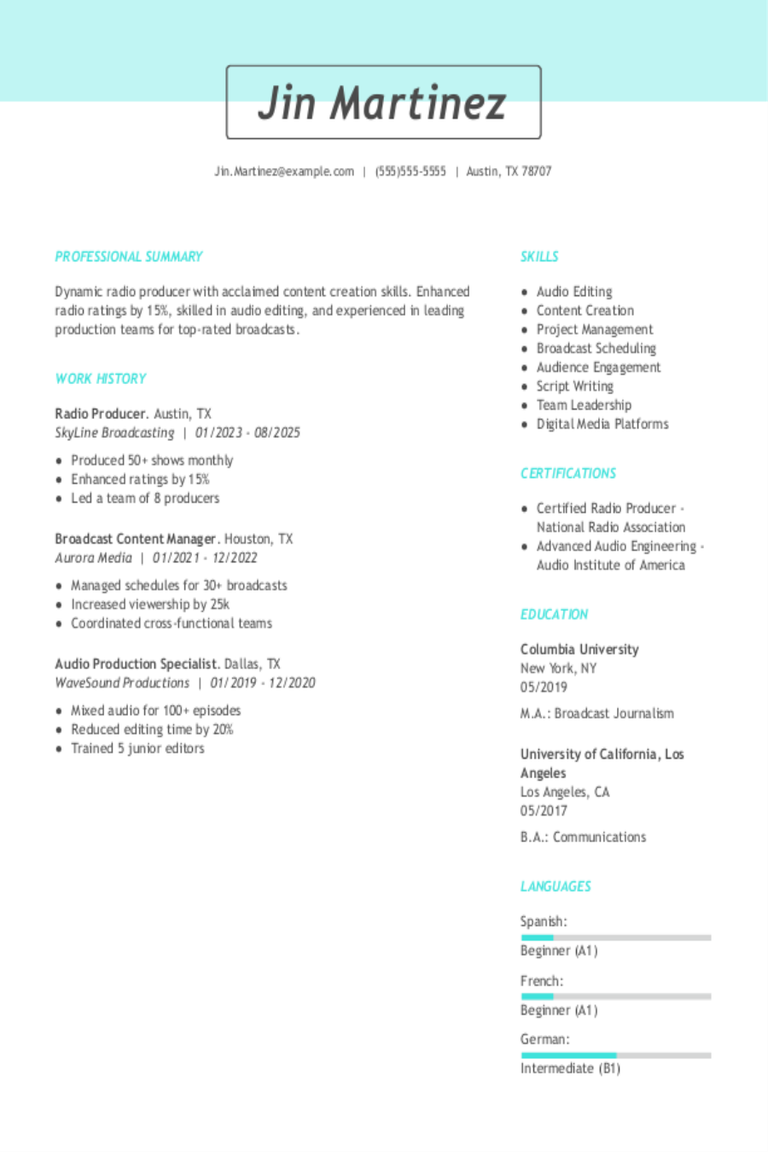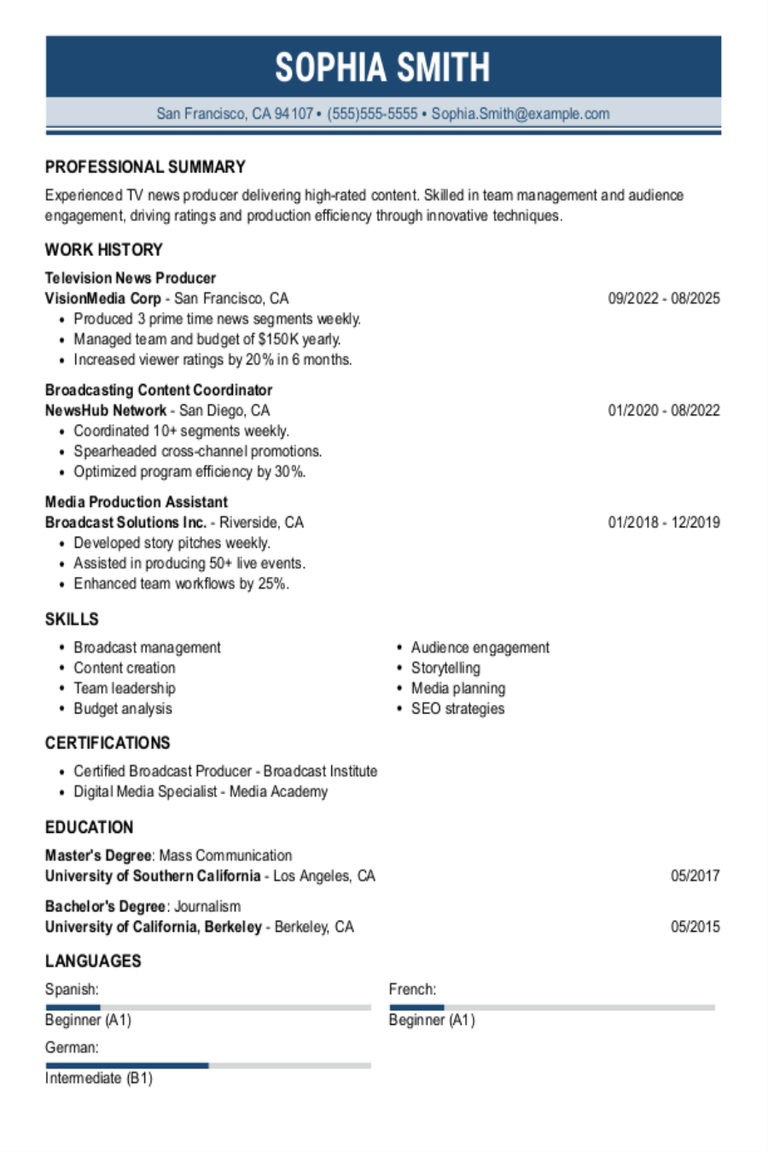Table of Contents
Get started with MyPerfectResume today!
- Build a resume on any device
- Pick an ATS-friendly template
- Tailor with AI copy suggestions
Why this resume works
- Quantifies accomplishments: By including measurable accomplishments like boosting sales by 50% and reducing delays by 25%, the applicant highlights their tangible impact and value.
- Uses action-oriented language: Using action verbs like “produced,” “led,” and “optimized,” the applicant conveys initiative and effectiveness.
- Showcases career progression: Progressing from media operations to video production leadership demonstrates increasing responsibility over time, showcasing steady career growth through diverse roles and impactful achievements.
More Video Producer Resume Examples
Review more video producer resume examples to see how to showcase your creativity, technical skills, and project achievements. These entertainment resume samples will help you craft a resume that highlights your expertise and sets you apart in production roles.
Entry-Level Video Producer
Why this resume works
- Effective use of keywords: By weaving role-specific keywords like video production and creative direction, the applicant crafts a resume ready to navigate through applicant tracking systems (ATS) efficiently.
- Shows digital literacy: Demonstrating computer skills, the applicant’s use of video editing platforms reveals a digital fluency essential for today’s tech-driven work environments.
- Centers on academic background: Highlighting relevant degrees from top universities, the education section shows foundational expertise important for early career growth.
Mid-Level Video Producer
Why this resume works
- Points to measurable outcomes: By achieving a 40% boost in audience engagement and increasing YouTube subscribers by 75%, the applicant highlights their impactful contributions and effectiveness in driving measurable outcomes.
- Demonstrates language abilities: Language skills in Spanish, French, and German indicate the applicant’s ability to navigate cross-cultural communication, supporting international projects effortlessly.
- Displays technical expertise: Certified as a video editor and PMP, the applicant showcases technical skills important for managing complex projects with precision and creativity.
Experienced Video Producer
Why this resume works
- Focuses on work history: By using a chronological resume format, the applicant effectively organizes over a decade of media roles, emphasizing career growth and impactful contributions in each position.
- Showcases impressive accomplishments: The inclusion of achievements like boosting video engagement by 20% and reducing project costs by 15% showcases measurable success.
- Emphasizes leadership skills: Leading teams to improve video reach by 30% annually reflects strong leadership skills, organizational abilities, and decision-making.
Video Producer Resume Template (Text Version)
Olivia Martinez
Cincinnati, OH 45202
(555)555-5555
Olivia.Martinez@example.com
Professional Summary
Dynamic video producer with 9 years’ experience in media, enhancing brands by 50%. Expert in team leadership, budget management, and creative direction. Certified video producer with proficiency in modern editing techniques.
Work History
Video Producer
Creative Visual Studio – Cincinnati, OH
June 2021 – July 2025
- Produced 20+ videos, increasing audience by 40%
- Led a team of 5, improving workflow efficiency by 30%
- Developed brand strategy, resulting in a 50% sales boost
Film Production Coordinator
Blueline Productions – Columbus, OH
January 2017 – May 2021
- Managed budgets up to 0K for film projects
- Coordinated schedules, reducing delays by 25%
- Enhanced pre-production efficiency by 15%
Media Operations Specialist
Dynamic Media Hub – Columbus, OH
January 2014 – December 2016
- Optimized media workflows, cutting costs by 10%
- Supported 50+ media projects per year
- Implemented new tools, boosting productivity by 35%
Languages
- Spanish – Beginner (A1)
- French – Intermediate (B1)
- German – Beginner (A1)
Skills
- Video Editing
- Project Management
- Creative Direction
- Budget Management
- Team Leadership
- Content Strategy
- Storyboarding
- Post-production
Certifications
- Certified Video Producer – American Film Institute
- Advanced Editing Techniques – National Broadcasting School
Education
Master of Fine Arts Film Production
New York University New York, NY
May 2013
Bachelor of Arts Media Studies
University of California, Los Angeles Los Angeles, CA
June 2011
Related Resume Guides
Advice for Writing Your Video Producer Resume
Explore our tips on how to write a resume for a video producer role and discover how to highlight your creative flair, technical skills, and storytelling prowess. Whether you’re crafting compelling visuals or managing production teams, this guide will help you stand out in the fast-paced world of video production.
Showcase your portfolio or projects
Having a portfolio or projects on your resume is key for artistic and creative roles in video production. They allow you to demonstrate your skills, style, and storytelling abilities through real work examples.
A strong portfolio helps potential employers or clients quickly assess whether your approach aligns with their vision. For video producers, this might include short films, commercials, documentaries, animations, or branded content—any project that highlights your ability to convey stories through visuals and sound.
To make your work easy to access, include a link to an online portfolio hosted on platforms like Behance, Dribbble, or your personal website. You can also feature a few key projects directly on your resume.
When doing so, use a structure similar to a job entry: begin with the project name and include the client or company if applicable. Then, provide a brief description of the project, and focus on your specific contributions and the impact of your work. Mention measurable outcomes when possible, such as audience reach, engagement metrics, or awards received.
Don’t hesitate to include freelance projects, academic work, or personal side gigs. These experiences not only add depth to your portfolio but also demonstrate your range, creativity, and dedication to the craft of video production.
Example of a projects section
Documentary Series on Urban Wildlife
Green Planet Productions
March 2022 – August 2022
- Produced and directed a five-part documentary series exploring wildlife in urban settings.
- Coordinated with a team of cinematographers and editors to deliver high-quality footage and storytelling.
- Implemented innovative filming techniques to capture rare animal behaviors, increasing viewership by 30%.
Virtual Reality Experience for Historical Site
Heritage Interactive Media
June 2021 – October 2021
- Developed a virtual reality experience showcasing the history of a national landmark.
- Collaborated with historians and artists to create an accurate and immersive narrative.
- Managed post-production processes, ensuring seamless integration of visual effects and sound design.
Want your resume to stand out? Check out our professional resume examples to see how to showcase your skills and experience.
Emphasize your most relevant skills
In a role like video producer, balancing technical and soft skills is essential for success. Highlight your ability to use industry-standard tools like Adobe Premiere Pro, Final Cut Pro, or After Effects in a dedicated skills section on your resume.
Include artistic strengths such as storytelling, editing precision, or color grading to showcase your creative side. This clear layout helps hiring managers quickly see the tools and talents you bring to the table.
Instead of just listing skills, integrate them into your work experience. For example, mention how you used advanced editing tools to streamline post-production workflows or how your communication skills helped coordinate with clients and team members during a project. This approach not only shows what you can do but also demonstrates how you’ve applied those abilities in real-world scenarios.
Remember that soft skills such as collaboration, time management, and problem-solving are just as important as technical know-how. Emphasize moments where these traits supported your project’s success, like managing tight deadlines or leading a team through creative challenges.
Weaving these details into both your skills section and job descriptions in the work history section creates a well-rounded view of your expertise as a video producer.
A clear and organized resume format helps highlight your expertise in video production, showcasing your skills and achievements effectively.
Choose a professional resume template
When choosing a resume template for a video producer role, it’s key to find one that mixes creativity with professionalism. Look for templates that are clean and well-structured, so your information is easy to read. A good template will have clear headings and sections that guide the reader’s eye naturally through your experience and skills. Steer clear of overly decorative designs that might distract from your content.
Ensure the format you select is compatible with ATS. Many companies use these systems to sort through resumes, so opt for a simple layout without complex graphics or unusual fonts. This ensures your resume gets seen by hiring managers. A straightforward design with well-organized sections can still showcase your creative side while maintaining professionalism.
Remember, as a video producer, showing both your organizational skills and creative flair is key. The right template will help you strike this balance, making it easier for employers to see why you’re the best fit for their team.
Create a standout resume with ease using our Resume Builder. It offers video producers like you tailored templates to highlight your creative skills.
Format your resume properly
Proper resume format is key for readability and professionalism. As a video producer, using a chronological resume can highlight your career progression and past roles in reverse order, showcasing your growth and expertise in the field clearly.
5 resume formatting tips
- Structure with clear headings: Use section headings like “Work Experience,” “Skills,” and “Portfolio” for easy navigation.
- Choose readable fonts: Select consistent resume fonts like Arial or Calibri for improved readability throughout the resume.
- Use bullet points: List achievements and responsibilities in bullet points to improve quick scanning by employers.
- Limit to one page: Keep your resume to one page unless you have extensive experience that requires more detail.
- Ensure proper alignment: Align text consistently with adequate spacing for a clean, professional appearance.
Make sure your resume gets noticed! Our ATS Resume Checker helps you format it right and use the best keywords.
FAQ
Do I need to include a cover letter with my video producer resume?
Yes, including a cover letter with your video producer resume can boost your application and make you more memorable to potential employers.
It offers an opportunity to express your enthusiasm for the role and showcase your storytelling skills, which are key in video production.
You can highlight specific projects you’ve worked on that align with the company’s content style or audience, showing how well you fit into their team.
This is also an ideal spot to mention any unique skills, like animation or scriptwriting, that aren’t fully detailed in your resume. Explore cover letter examples to get inspired.
Consider leveraging resources like our Cover Letter Generator to help structure your thoughts effectively with professional templates and content suggestions.
How long should a video producer’s resume be?
For a video producer, a one-page resume is usually best to keep your qualifications concise and focused. Hiring managers often spend only seconds reviewing resumes, so highlight your most relevant skills like video editing skills, project management expertise, and storytelling abilities upfront.
If you have extensive experience or notable achievements, such as directing high-profile projects or winning industry awards, a two-page resume is appropriate. Just ensure every detail adds value and relates directly to the role you’re pursuing.
To determine the ideal length for your specific career stage, explore our guide on how long a resume should be for tailored tips and examples.
How do you write a video producer resume with no experience?
If you’re crafting a video producer resume but lack direct experience, highlight your related skills, education, and projects that show your potential. Here are a few tips to help you get started:
- Highlight education and training: Start with your degree in film, communications, or a related field. Include any relevant coursework or projects that involved video production techniques, editing software, or storytelling.
- Showcase transferable skills: Emphasize skills such as project management, creativity, attention to detail, and communication. These are valuable in video production and can be developed through various experiences like school projects or internships.
- Include personal or academic projects: List any videos you’ve produced for school assignments or personal projects. Detail the concept development process, shooting techniques used, editing software skill (like Adobe Premiere Pro), and the impact of these projects.
Look into our comprehensive guide on creating a resume with no experience for more strategies and examples tailored by Certified Professional Resume Writers.
Rate this article
Video Producer
Share this page
Additional Resources

Video Interview Tips: How to Prepare, Practice, & Stand Out

Music Producer Resume Examples & Templates
Explore music producer resume examples that show how to spotlight your creativity, technical skills, and collaboration experience. Find tips to craft a resume that highlights your ability to bring music

Radio Producer Resume Examples & Templates
Explore radio producer resume examples that show how to highlight your experience creating engaging content, managing schedules, and working with hosts. These examples and tips will help you showcase creativity

Television News Producer Resume Examples & Templates
Browse television news producer resume examples that highlight storytelling and production skills. Discover how to showcase your experience in managing news broadcasts and engaging audiences.Build my resumeImport existing resumeCustomize this

Videographer Resume Examples & Templates
Explore videographer resume samples and learn tips to showcase capturing moments and creating engaging visual stories.Build my resumeImport existing resumeCustomize this templateWhy this resume worksHighlights industry-specific skills: The applicant’s resume

Video Editor Resume Examples & Templates
Discover video editor resumes examples and tips to learn how to showcase you cut and arrange footage, add effects, and create engaging stories.Build my resumeImport existing resumeCustomize this templateWhy
